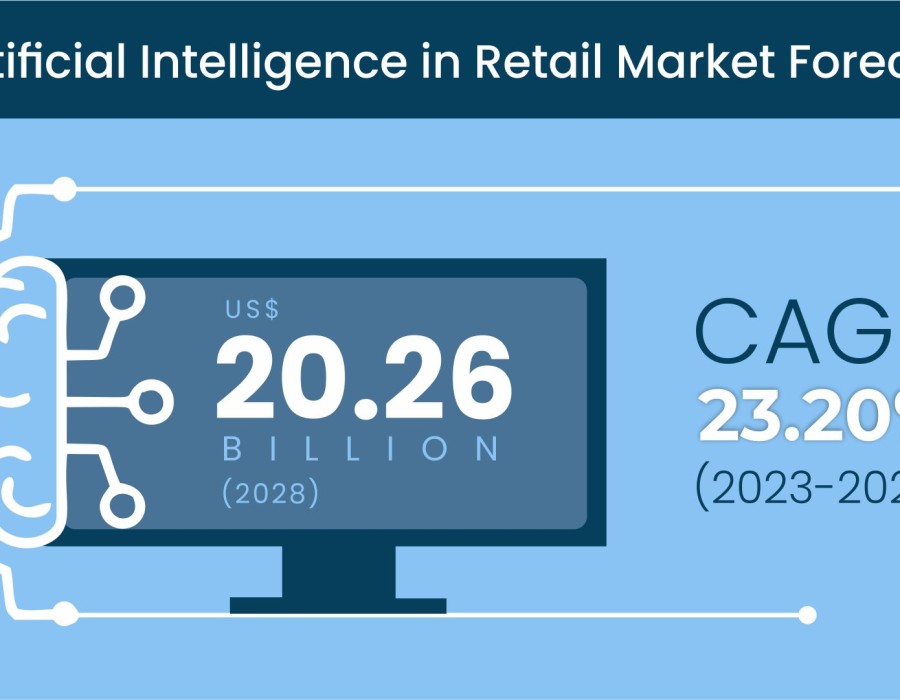Artificial intelligence (AI) has revolutionized the retail industry, becoming a critical factor in driving its growth and transformation. As retailers adopt artificial intelligence solutions to optimize operations, personalize customer experiences, and streamline supply chains, the artificial intelligence in retail market continues to expand at an accelerated pace. Understanding the top trends fueling this growth provides insight into how AI will shape the future of retail.
According to Stratview Research, the artificial intelligence in retail market was estimated at USD 5.79 billion in 2022 and is likely to grow at a CAGR of 23.20% during 2023-2028 to reach USD 20.26 billion in 2028.
1. Hyper-Personalization of Customer Experiences
A major trend driving AI's expansion in retail is the demand for hyper-personalized shopping experiences. Artificial intelligence enables retailers to analyze vast amounts of customer data, including purchase history, browsing behavior, and preferences. Through advanced machine learning algorithms, artificial intelligence can predict customer needs and offer tailored product recommendations, promotions, and content. For example, e-commerce giants like Amazon utilize AI-driven recommendation engines to enhance user experience, boosting customer engagement and driving sales. Personalization is now a key competitive advantage for retailers.
2. AI-Powered Supply Chain and Inventory Optimization
Artificial intelligence is transforming supply chain management and inventory control, two critical components of retail operations. Through predictive analytics and demand forecasting, AI helps retailers maintain optimal stock levels, minimizing the risks of overstocking or stockouts. AI can predict trends and adjust inventory levels in real-time based on consumer behavior, weather patterns, and market shifts. Additionally, automation in warehouses and distribution centers, powered by artificial intelligence, has significantly improved efficiency and reduced costs. Companies like Walmart and Alibaba are leveraging AI to streamline their logistics and supply chain operations.
3. Voice Commerce and Conversational AI
Voice commerce, driven by AI-powered virtual assistants like Amazon’s Alexa and Google Assistant, is another trend fueling the expansion of artificial intelligence in retail. Consumers are increasingly using voice commands to search for products, make purchases, and receive personalized recommendations. Retailers are capitalizing on this trend by integrating conversational AI into their sales strategies, making the shopping experience more seamless and hands-free. As voice commerce continues to grow, retailers are expected to further enhance their AI capabilities to capture this emerging market.
4. AI in Fraud Detection and Security
The rise of e-commerce has also increased the need for robust security measures, making artificial intelligence a key player in fraud detection and prevention. AI-powered systems can analyze transactional data in real-time, identifying unusual patterns or anomalies that may indicate fraudulent activity. By automating fraud detection processes, artificial intelligence helps retailers safeguard their operations while minimizing risks. This is particularly crucial for online retailers, who face rising cyber threats and challenges in securing digital transactions.
5. Augmented Reality (AR) and AI Integration
Augmented reality, enhanced by artificial intelligence, is transforming how customers interact with products before purchasing. Retailers are increasingly using AR to create virtual fitting rooms or allow customers to visualize products in their homes. artificial intelligence plays a significant role in making AR more intuitive and personalized. For example, IKEA's AR app, which lets customers place virtual furniture in their living spaces, is powered by AI to deliver accurate results. This trend enhances the shopping experience, especially in sectors like fashion and home decor.
Conclusion
The expansion of artificial intelligence in the retail market is being fueled by a combination of technological advancements and changing consumer expectations. Hyper-personalization, AI-powered supply chain management, voice commerce, enhanced security, and AR integration are just a few of the top trends shaping the future of retail. As artificial intelligence continues to evolve, retailers that embrace these trends will be better positioned to capture market share, improve customer satisfaction, and drive long-term growth.






Comments